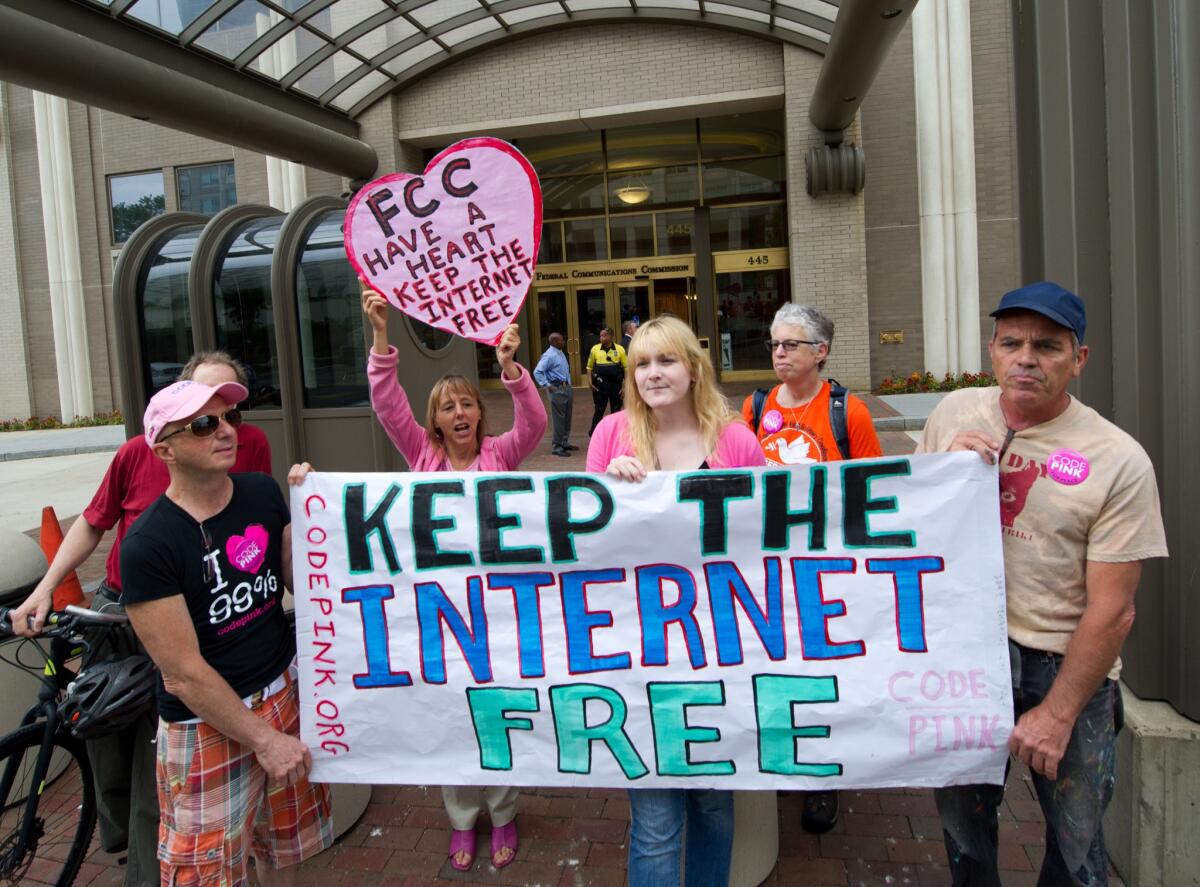Cable, wireless groups voice support for GOP’s net neutrality bill

- Share via
Reporting from Washington — The heads of leading cable TV and wireless industry trade groups on Wednesday expressed enthusiasm for Republican legislation setting new Internet traffic rules because it would avoid the legal battles they said were coming if the Federal Communications Commission enacts controversial new regulations to protect so-called net neutrality.
Michael Powell, president of the National Cable & Telecommunications Assn., and Meredith Atwell Baker, president of CTIA-The Wireless Assn. -- both former Republican FCC commissioners -- said congressional action was the only way to provide certainty to Internet service providers so they could continue to expand their networks.
------------
For the record:
12:49 p.m.: In an earlier version of this post, Meredith Attwell Baker’s middle name was misspelled Atwell.
-----------
“The commission has turned itself in knots for 10 years trying to develop a simple set of open Internet regulations,” Powell, who was FCC chairman from 2001-05, told a House Energy and Commerce Committee panel. “Congress has the power and the responsibility to end this roller coaster.”
Powell and Baker, who served on the FCC from 2009-11, spoke at the first hearings on the Republican’s draft legislation.
Unveiled last week, the bill would prohibit broadband firms from blocking websites, slowing connection speeds and charging companies for faster delivery of their content.
Those are the basic principles of net neutrality, which is designed to guarantee the free flow of information on the Internet. But there are sharp differences between most Democrats and Republicans on how to enact those rules.
The FCC has twice tried to do so with regulations under one section of the Telecommunications Act. But those moves were rejected by federal judges, the most recent in January 2014.
Now the FCC appears ready to put rules in place under a different section of the law that would treat broadband providers like regulated phone companies and other utilities.
President Obama called for such a move in November and FCC Chairman Tom Wheeler said he will release a proposal on Feb. 5 and hold a vote three weeks later.
Rep. Fred Upton (R-Mich.) and Sen. John Thune (R-S.D.) introduced their legislation on Friday.
“Given the choice between enacting prudent legislation or leaving the FCC to tackle this with tools unfit for the task, we choose to take action,” Upton, chairman of the House Energy and Commerce Committee, said Wednesday.
Democrats and executives from two Internet firms, Amazon.com and Etsy, said Wednesday that the legislation was a good start. But they were concerned the bill wasn’t broad enough to allow the FCC to adapt to new threats to the free flow of online traffic.
“How can we be sure that this bill anticipates every possible form of discrimination?” said Chad Dickerson, chief executive of Etsy, an online marketplace for handmade and vintage goods.
Paul Misener, Amazon’s vice president of global public policy, said the bill had some potential loopholes, such as an exemption for “specialized services,” that broadband providers could exploit to allow paid prioritization and other discriminatory behavior
Democrats echoed their concerns, saying the bill would take away the FCC’s authority to regulate broadband for other abuses.
“The Internet is dynamic. We don’t know what tomorrow will bring,” said Rep. Doris Matsui (D-Sacramento). “The FCC needs flexibility to tailor rules to adapt to changes in the marketplace.”
Rep. Greg Walden (R-Ore.), who chaired Wednesday’s hearing, said Republicans were open to changes in the bill.
It’s not our intent to ban [paid prioritization] and create a loophole that allows it to go through,” he said.
Thune, who chaired a Senate Commerce Committee hearing on the bill Wednesday as well, said it was not a final product but that Congress needed to assert its responsibility to make policy.
“The entire Internet needs this kind of statutory certainty and only Congress can provide it,” he said.
Republicans appeared united in opposition to the FCC acting on its own to impose utilitylike regulations on broadband providers. Baker said that if the FCC moved ahead with such a plan, “the wireless industry will have no choice but to look to the courts.”
Powell said congressional action was the only way to avoid a legal battle that could last at least three years.
“Uniquely, Congress has the power to eliminate all this legal uncertainty,” he said.
For breaking economic news, follow @JimPuzzanghera on Twitter







